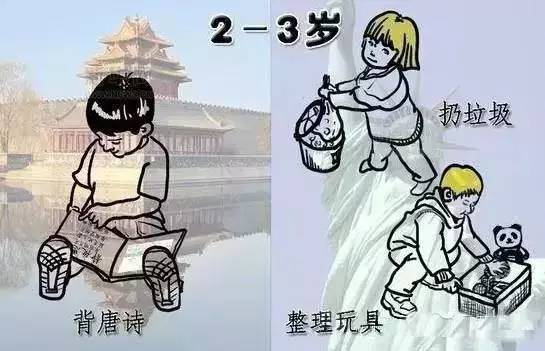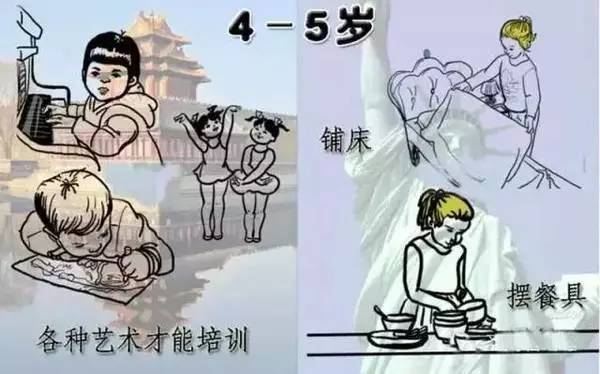In China, if a child actively helps his parents with housework, it will be exaggerated as filial piety. However, in the United States and other Western countries, it is not a rare thing for children to do housework, but rather the obligation that children need to perform in the family.
The difference between Chinese and Western families in the concept of children's housework may be that cultural differences lead to different ways of education, but we should realize that compared with many families nowadays, the family education is much better than foreign family education. We are smarter.


Harvard University scholars have done a research and have come to an amazing conclusion:
Children who love to do housework and children who do not like housework have an employment rate of 15:1 in adulthood and a crime rate of 1:10. Children who love to do housework have a low divorce rate and a low prevalence of mental illness.
Another expert pointed out that in the process of children's growth, housework is closely related to the development of children's motor skills, cognitive ability and responsibility.
In the United States, children are important family members regardless of age, so it is important to tell them about their responsibilities in the family, and to take on housework is the best way. What kind of housework can children of different ages do?
This American child's housework list may be a reference.

â–² 9-24 months: You can give your child some simple instructions, such as letting the baby throw the dirty diaper into the trash.

â–²2-3 years old: You can throw garbage into the garbage bin under the direction of the parents, or help when the parents ask for help; help the mother to put clothes on the hanger; use the toilet; brush the teeth; water the flowers (parents give the children the right amount Water); organize your toys before going to bed at night.

â–² 3-4 years old: better use of the toilet; wash your hands; brush your teeth more carefully; carefully water the flowers; pack your own toys; feed the pets; retrieve the newspapers on the ground at the gate; make beds for your mother before going to bed, such as taking pillows , quilt, etc.; put the bowl in the kitchen sink after dinner; help the mother put the folded clean clothes back into the closet; put their dirty clothes in the basket with dirty clothes.

â–² 4-5 years old: not only must master the housework required in the previous stages, but also can retrieve the letter in the mailbox independently; make the bed by himself; prepare the table (starting with the help of the parents, slowly let the children help the plate) Put the dirty dishes back into the kitchen after meals; put the washed and dried clothes back in the closet (teaching the children how to correctly stack different clothes); prepare the clothes to be worn the next day.

â–² 5-6 years old: not only must master the housework required in the previous stages, but also help to clean the table; make bed / change sheets (from helping the mother take the dirty sheets and bring clean sheets to start); prepare yourself Two days to go to the school to use the schoolbag and shoes to be worn (and all kinds of things to go to school the next day); clean up the room (will pick up the mess and put it back).

â–² 6-7 years old: Not only must master the housework required in the previous stages, but also can wash dishes with the help of parents, and can clean their own rooms.
Anyone who is lazy and does not love labor when he is a child can grow up and suffer hardships, and his independence and self-confidence are poor, and his work achievements are average. Therefore, Wang Zicheng’s parents should create an environment and conditions for their children when they are raised from their children. They should carry out early labor training for their children, let the children do what they can, and let the children create a pair of hardworking hands to benefit them for life.
Children grow up in the experience, the more experience, the deeper the feeling. Parents should try not to do anything for children that they can do. The child is further stepped back, which is called growth.

American experts talk about children learning to do housework
Whether your child has reached the age of helping you with some simple chores, how to help your child develop good habits to help with housework, early education experts from the United States provide you with the following suggestions:
If you ever had the experience of asking your child to clean up the table or his toys, you will know that this is definitely a tough war. A child in the preschool age (3-6 years old) has begun to Adults’ demands show impatience and resistance. This may make you feel that it is easier to do it than to ask him to do it.
For parents, it is better to say that it is a burden on parents when they start to help their children. But this is a good time to train your child to develop good habits to help people. Four or five-year-olds already have the good coordination, sensitivity, and concentration required to perform simple housework. Even if they don't fully understand their parents' intentions, it is much more beneficial for children to do housework. Parents should fully trust their children and let them be confident to do a certain job independently. At the same time, it is also necessary to help children understand that helping others is the responsibility and obligation of everyone.
Although children will find it a fun thing to do some housework, it is not easy to let children develop good habits. Children of this age are eager to be dependent. Therefore, it is not impossible to ask children to form a good habit of writers.
How to make the child develop this habit easily and sustainably, the following points parents must pay attention to:
1. Let the child feel his importance. Catering to the needs of the children at this stage, they are eager to be seen as adults, telling him that his work will greatly help the family, which will save more time for the whole family to entertain.
2. Give the child the right to choose. Give your child a list of all the chores he can do and let him/her choose one or two of them, which will make him/her feel that he has the power to choose and control. Therefore, I am willing to do the work of my choice.
3. Refine the task and give the child a demonstration. A holistic concept (like "packing your room") can confuse children and frustrate their enthusiasm. Split a task into several steps (put the toy into the toy box, put the book on the shelf, etc.) so that he can understand your requirements. In addition, parents should personally give the child a demonstration and answer all his questions until he can do it independently. Parental patience is very important, even if he forgets a certain step, don't criticize him, and cheerfully remind him to know that he remembers.
4. Forget "perfectionism." For children of this age, active participation is more important than the outcome. If your child's socks are not clean enough, the table is not bright enough, don't criticize his work, criticism will defeat the child's self-esteem, and will reduce his willingness to cooperate with others. If a job requires perfection every time, it is definitely not a job for the child.
5. Provide the child with the right tools. Don't give your child a broom that is taller than him. Give him a small broom to clean the breadcrumbs on the chopping board. If you want her to help you clean up the table, then just let her take the leftover food to help you get into the kitchen.
6. Give your child a good example. Parents should never complain about the cumbersomeness and boring of doing housework in front of their children. This will convey a message to the child that doing housework is a terrible thing. Parents should try to make the children realize that helping adults to do these things as soon as possible can allow more time to play with him/her.
7. Don't force your child. Don't use a forced approach to give your child a tempering process or a little room. For example, "I can let you play for ten minutes, ten minutes, you must go to clean your desk immediately." This way.
8. Provide rewards. Commendations and rewards can be of great help to a child's good habits, and another effective strategy is to give the child a reasonable plan: draw a chart of each step of his/her task. Whenever she successfully completes one of the steps, she rewards her with a little red star. When he successfully completes the entire task, reward him with a reasonable reward he wants, pay attention, don't use money and material rewards.
9. Arrange all tasks reasonably. For preschool children, repeating something can make the child feel bored. Therefore, we should constantly change the content of the task, but never break the traditional habit of division, such as letting the boy drag the kitchen, the girl will let her do some work that requires careful work.
10. Give children room for development. Once the child has mastered the work he had previously given to him/her, he or she should be asked to make a higher request to expand his/her work. For example, he should be able to complete the classification of clothes before washing, and under your guidance, he should be allowed to learn how to use the washing machine.
Source: Chongqing Times reprinted from American high school
· Premium quality: Its stainless steel body & acrylic chamber design make the grinders extremely durable with no risk of glass breakages. Its strong and fast motor offers long term durability that will not rust or corrode ensuring safety of your food. No over flavoring – bright light illuminates food clearly to help prevent over flavoring of food. A Cap at bottom that prevents leakages while also help keeping spices dry in humid environment.
· Adjustable Coarseness: Its coarseness has different levels of operation to regulate the size of the chosen spice.
· One Button Single-handed Operation: Perfect for your loved ones who have arthritis or chronic hand pain. Use it while your one hand is busy stirring stew, marinating steak, tossing salad or even while answering your phone.
· Battery Powered: Each grinder uses 4 AA batteries(not included) which are easy to install with its easy to open cover. Easy to use, you can bring it to travel, BBQ, camping, picnic.
· Perfect Gift: It's the best gift for housewarming parties, Weddings, Birthdays, Mother's Day, anniversary.

Electric Pepper Grinder,Electric Mill Pepper,Electric Pepper Mill,Electric Salt And Pepper Grinder
Yongkang Lianyang Industry & Trade Co., Ltd , https://www.yklianyang.com